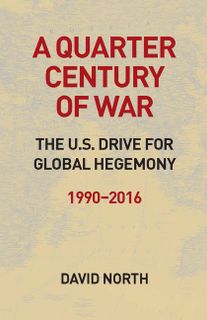by DAVID NORTH

“In the period of crisis the hegemony of the United States will operate more completely, more openly, and more ruthlessly than in the period of boom.”
— Leon Trotsky, 1928
“U.S. capitalism is up against the same problems that pushed Germany in 1914 on the path of war. The world is divided? It must be redivided. For Germany it was a question of ‘organizing Europe.’ The United States must ‘organize’ the world. History is bringing mankind face to face with the volcanic eruption of American imperialism.”
— Leon Trotsky, 1934
This volume consists of political reports, public lectures, party statements, essays, and polemics that document the response of the International Committee of the Fourth International (ICFI) to the quarter century of US-led wars that began in 1990–91. The analyses of events presented here, although written as they were unfolding, stand the test of time. The International Committee does not possess a crystal ball. But its work is informed by a Marxist understanding of the contradictions of American and world imperialism. Moreover, the Marxist method of analysis examines events not as a sequence of isolated episodes, but as moments in the unfolding of a broader historical process. This historically oriented approach serves as a safeguard against an impressionistic response to the latest political developments. It recognizes that the essential cause of an event is rarely apparent at the moment of its occurrence.
Much of what passes for analysis in the bourgeois press consists of nothing more than equating an impressionistic description of a given event with its deeper cause. This sort of political analysis legitimizes US wars as necessary responses to one or another personification of evil, such as Saddam Hussein in Iraq, the “warlord” Farah Aideed in Somalia, Slobodan Milosevic in Serbia, Osama bin Laden of Al Qaeda, the Mullah Omar in Afghanistan, Muammar Gaddafi in Libya; and, most recently, Bashar al Assad in Syria, Kim Jong Un in Korea, and Vladimir Putin in Russia. New names are continually added to the United States’ infinitely expandable list of monsters requiring destruction.
The material in this volume is the record of a very different and far more substantial approach to the examination of the foreign policy of the United States.
First, and most important, the International Committee interpreted the collapse of the Stalinist regimes in Eastern Europe in 1989–90, and the dissolution of the Soviet Union in 1991, as an existential crisis of the entire global nation-state system, as it emerged from the ashes of World War II. Second, the ICFI anticipated that the breakdown of the established postwar equilibrium would lead rapidly to a resurgence of imperialist militarism. As far back as August 1990—twenty-six years ago—it was able to foresee the long-term implications of the Bush administration’s war against Iraq:
It marks the beginning of a new imperialist redivision of the world. The end of the postwar era means the end of the postcolonial era. As it proclaims the “failure of socialism,” the imperialist bourgeoisie, in deeds if not yet in words, proclaims the failure of independence. The deepening crisis confronting all the major imperialist powers compels them to secure control over strategic resources and markets. Former colonies, which had achieved a degree of political independence, must be resubjugated. In its brutal assault against Iraq, imperialism is giving notice that it intends to restore the type of unrestrained domination of the backward countries that existed prior to World War II. [1]
This historically grounded analysis provided the essential framework for an understanding, not only of the 1990–91 Gulf War, but also of the wars that were launched later in the decade, as well as the post-9/11 “War on Terror.”
In a recently published front-page article, the New York Times called attention to a significant milestone in the presidency of Barack Obama: “He has now been at war longer than Mr. Bush, or any other American president.” But with several months remaining in his term in office, he is on target to set yet another record. The Times wrote:
If the United States remains in combat in Afghanistan, Iraq and Syria until the end of Mr. Obama’s term—a near-certainty given the president’s recent announcement that he will send 250 additional Special Operations forces to Syria—he will leave behind an improbable legacy as the only president in American history to serve two complete terms with the nation at war. [2]
World Socialist Web Site for more
